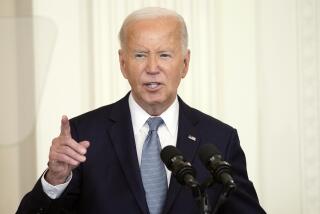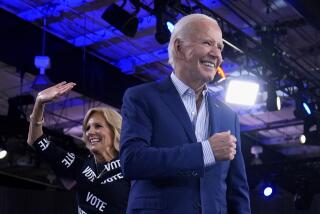Forced to Play Catch-Up, Bush Retools Strategy
- Share via
ROMULUS, Mich. — Declaring himself the underdog in a race he led for months, George W. Bush sought Thursday to ease Republican jitters and stop Al Gore’s momentum by announcing a shake-up in his campaign’s style and strategy.
As a new batch of polls confirmed Gore’s ascendancy, Bush also appeared ready to back off his insistence that the vice president debate on his terms. “It will be worked out,” the Texas governor said. “I want to make it clear to you there’s going to be debates.”
Spelling out his strategic changes, Bush said he would have more “one-on-one” encounters with voters, holding town hall-type meetings and perhaps making house calls--the sort of stylistic shift that helped save his campaign after he lost the New Hampshire primary.
“I’d like to be able to be with people more often in less formal settings,” Bush told reporters standing beneath the wing of his campaign plane after a stop in Detroit. “It’s a better picture.”
The changes come as nervousness within the GOP’s ranks spread to some House candidates who are counting on Bush to help keep Republicans in charge of Congress.
In California, where roughly half a dozen seats could be key to control of the House, GOP strategist Allan Hoffenblum expressed concern about a Bush undertow if he fails to quickly right his campaign.
Nationally, the contest still is up for grabs, Hoffenblum said. “But there’s no doubt Gore has the momentum at this key period of time going into the fall.”
Bush announced the retrenchment on a day that three new national polls suggested that Gore has, at the least, consolidated the gains he made coming off his party’s convention in Los Angeles.
A survey for the Reuters news service showed Gore leading by 6 percentage points, 46% to 40%. A Gallup tracking poll showed Gore ahead 47% to 44%, within the survey’s margin of error. The Washington Post had the race dead even at 47% for each candidate.
The latest numbers could give Democrat Gore a psychological boost: Since 1952, virtually every candidate leading in national polls soon after Labor Day has gone on to win the race.
Bush acknowledged Gore’s edge. Asked if he was now the underdog, Bush replied: “Yeah, I am the underdog. But I was the underdog when I first started. Nothing’s changed about the underdog status.”
However, for a candidate with a yawning lead in the polls just a few weeks ago, Bush has faced a remarkable reversal of fortune.
More significantly, he also appears to be losing ground in the state-by-state race to amass the 270 electoral votes needed to win the White House. One Republican strategist familiar with the campaign’s operations said Bush’s own internal polls show support for the GOP nominee slipping in several key states.
Despite growing rumblings in Republican circles, Bush will not shake up his top staff of Austin loyalists, said Karen Hughes, the campaign’s communications director. “Stick with those that brung you, as they say in Texas,” she said.
Bush also took aim at his GOP critics. “That’s Washington,” he said. “That’s the place where people are getting ready to jump out of the foxhole before the first shell is fired.
“I guess some of my supporters wanted it to be a runaway,” Bush added. “I know we’re fixing to get into the heat of the contest, and it’s good to figure out who’s nervous and who’s not nervous right now.”
At the same time, however, Bush conceded that he needed to do a better job selling his candidacy and the $1.3-trillion tax cut that is the centerpiece of his economic plan. He said he needed to appear more often with “real people” who will “get results under a Bush administration.”
Speaking to reporters, he said, “When I come back on the back of the airplane and speak to you . . . people don’t get a sense of my ability to relate to people. They don’t get a sense that my plan has got real purposes for people.”
As part of his new strategy, aides said Bush would copy the town hall meetings that Gore has staged with great success and may soon start dropping by the homes of families who could benefit from his proposed tax cuts.
On the matter of debates, the GOP nominee appeared to retreat from his insistence that Gore agree to a Bush-imposed regimen that would have shunned two of the three debates scheduled by a nonpartisan commission.
On Wednesday, Bush launched a TV ad attacking Gore for refusing to accept his debate plan. But Thursday he said: “I’m confident that there will be debates. As to what they look like and where they are, it’ll be worked out in due course.” Later he added, “You cannot run for the presidency without presidential debates.”
Ironically, the effort to jump-start his campaign highlighted what lately has been a problem for Bush. Once more, a discussion of tactics and campaign strategy overshadowed what was supposed to be the substantive theme of a trip through battleground states along the Great Lakes.
In Michigan, Bush campaigned with the most popular Persian Gulf War figures from his father’s administration, retired Army Gens. Colin L. Powell and H. Norman Schwarzkopf. At a Veterans of Foreign Wars post in Westland, Mich., a Detroit suburb, Powell accused the Clinton administration of cutting the defense budget too deeply.
“Only now are they starting to invest again,” Powell told several hundred veterans. “But it’s too late, and they’re not investing enough.”
Bush, too, described the military as in decline. He promised to raise military pay, invest in high-tech weaponry and to stick to clearly defined goals for missions overseas.
“Proper planning, a proper vision, requires leadership,” Bush said. “And I’m ready to lead the country. I’m ready to lead the country.”
But many Republicans were less worried Thursday about military preparedness than Bush’s campaign mettle. On Capitol Hill, one senior Republican aide who declined to be identified suggested members were “gravely concerned” about the state of the race.
“People are concerned the Bush campaign is getting desperate and may try to ‘triangulate’ and cut what’s a real thin tether to the Congress anyway,” said the aide, referring to President Clinton’s 1996 reelection strategy of keeping at arm’s length from his party’s congressional wing.
Throughout the campaign, Bush has maintained a discreet distance from Republicans on Capitol Hill and their more pugnacious style of conservatism.
Even so, many House candidates are tying their fortunes to the GOP governor.
In California, Republicans who know Bush is a longshot to carry the state expect him to at least run close enough to help their cause. That is why the latest poll giving Gore a 6-point national lead was so worrisome.
“That has to mean [that Gore] is up 10 to 11 points here in California,” strategist Hoffenblum said, suggesting that such a huge gap would be difficult for local candidates to make up on their own.
But some Republicans found middling comfort in the fact that Gore has surged so dramatically--suggesting that he could collapse just as quickly.
“How long ago was it the polls had Bush ahead nationwide and within 3 points in California?” asked Rep. Tom Campbell (R-San Jose), who faces a stiff challenge trying to unseat incumbent Democratic Sen. Dianne Feinstein. “To say [the presidential race] is volatile is an understatement and all of us need to recognize that.”
*
Times political writer Cathleen Decker and staff writer James Gerstenzang contributed to this story.
To listen to Mark Z. Barabak discuss the current state of the Bush campaign, go to The Times’ Web site:
https://www.latimes.com/bushcampaign.
More to Read
Get the L.A. Times Politics newsletter
Deeply reported insights into legislation, politics and policy from Sacramento, Washington and beyond. In your inbox twice per week.
You may occasionally receive promotional content from the Los Angeles Times.










